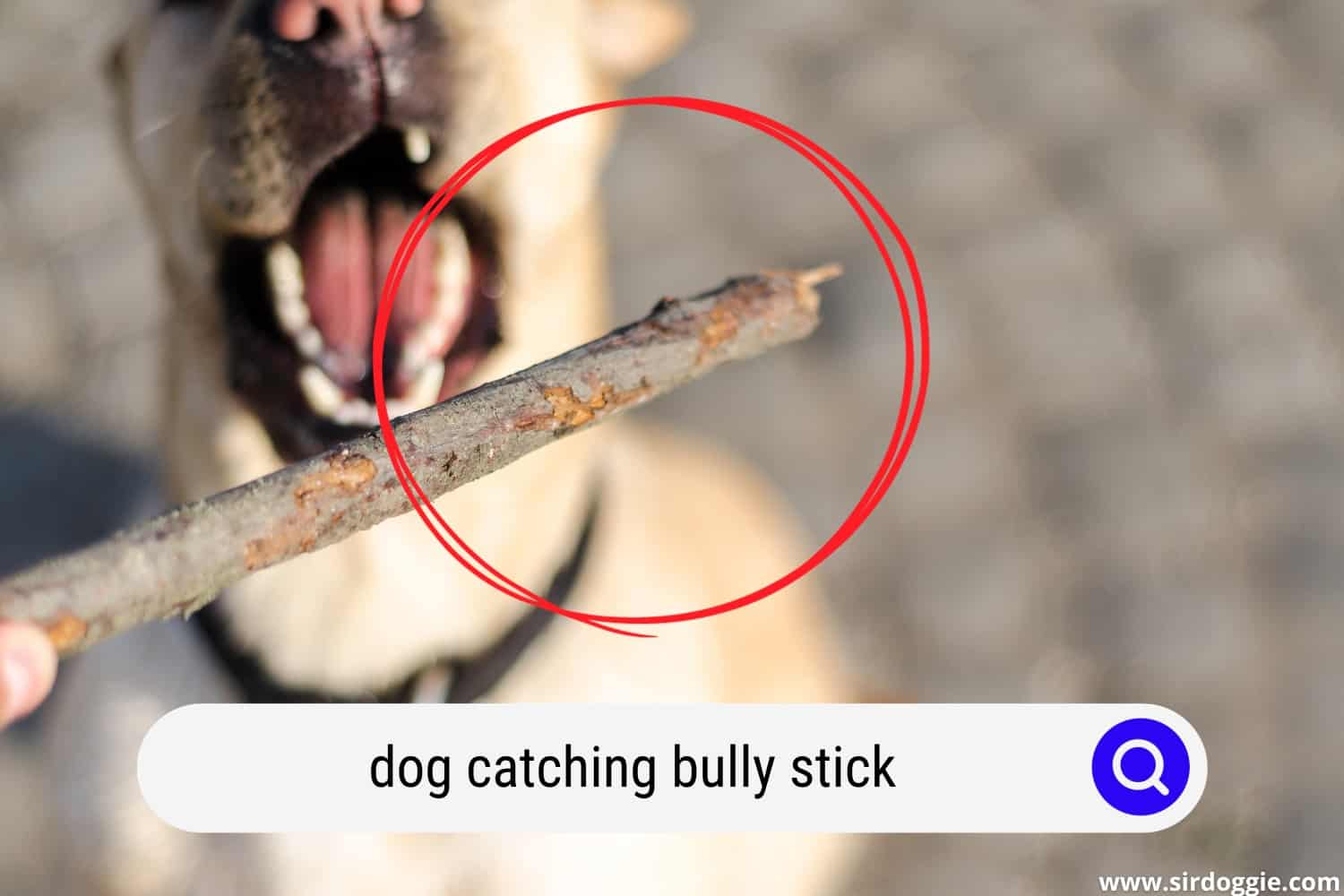Do Bully Sticks Make Dogs Aggressive?
Bully sticks are popular, all-natural chewy treats for dogs that are manufactured by stretching and twisting beef or steer penises before drying them out and cutting them into an appropriate variety of sizes for different dog breeds to enjoy. Dehydration is often the most common method used for drying these out and giving them a jerky-like consistency, but they can also be roasted or smoked as well. They include no artificial colors, flavors, preservatives, or ingredients, and the one-ingredient simplicity makes them as natural and safe as one can possibly get.
However, do these natural, meaty treats contribute to dogs becoming aggressive?

No, bully sticks are nutritious chews for dogs, and they are the ideal chewing option for your dog to help relieve some of their stress and aggression. Bully sticks are sturdy enough to withstand even the most ferocious chewing of dogs, and they can provide a solid 30 minutes of chewing time that benefits their oral and mental health, especially since the aggressive chewing needed for them releases endorphins that make your dog feel good.
The only common link between bully sticks and aggression is a dog’s being immersed in the satisfying chew or naturally food-possessive and displaying aggressive behavior when approached or when an owner or other animal tries to take the bully stick away for any reason.
In this article, we’ll look at both the benefits and drawbacks of this treat so you can decide whether it’s right for your dog.
Why do bully sticks make dogs aggressive?
Any long-lasting treat or chew for a dog is designed for either teething puppies or for grown dogs to chew out their stress and aggression—bully sticks are ideal for this process. It’s common knowledge to avoid approaching any animals when they eat, but when a dog is actively in the works of chewing out their frustrations (especially with an edible chew), they are likely to show more hostility due to a fear of their food being taken away or simply from already being high-strung and trying to decompress.
The simple one-ingredient recipe for these sticks contains no chemicals or additives, so there are no unusual substances present that may affect your dog’s behavior with this type of chew aside from their temperament and preferences for any attention or interactions that occur when they would already be eating or chewing on a preferred toy.
Food aggression and territorial behavior in dogs
Dogs typically always guard their food, and this does not exclude bully sticks or other treats. Many dogs have this instinct built into their DNA as a survival mechanism since their ancestors would have needed to be protective of their food sources to avoid starvation. Dogs can be incredibly possessive and guard food, toys, and even specific places (since dogs are naturally territorial as well)—they may even guard oddities like tissues or paper towel rolls.
Furthermore, some canines only show territorial behavior and guard against other dogs, others may only defend against human beings and other animals, and others may not have any instinct to protect their “belongings” or territory at all.
Why Bully Sticks Are a Healthy and Popular Treat Choice
Great digestibility
Unlike some of the other chewable treats available, bully sticks are easily digested and break down quickly due to their single-ingredient simplicity and lack of additives, preservatives, and other unnatural ingredients. Whereas rawhides have become notorious for causing digestive upset in some dogs as well as breaking off and becoming a dangerous choking hazard, these sticks lack those risks entirely.
Bully sticks are a delectable, single-ingredient treat made entirely of high-protein beef—this makes these beefy treats a complete source of amino acids, which are necessary for your dog’s muscles and brain to function properly, as well as keep their skin and coat healthy. Bully sticks are the greatest alternative to processed snacks and chews if your dog has food allergies or sensitivities because they are free of synthetic chemicals, additives, and preservatives. However, if your dog has an allergy or sensitivity to beef, steer clear of these chewy sticks.
They improve your dog’s oral and mental health
One of the primary advantages that pet parents obtain from bully sticks is improved oral health. A bully stick can keep dogs occupied for far longer than most treats, and all of this chewing causes the necessary mechanical abrasion to occur that helps eliminate tartar and keep your dog’s teeth healthy.
Furthermore, chewing and licking also cause the release of endorphins, which relieve anxiety while providing mental stimulation for your dog. Bully sticks (or any long-lasting chew, for that matter) can be incredibly useful if your dog has separation anxiety or phobias, and they also help your dog de-stress when feeling overstimulated or on edge.
Are bully sticks appealing to dogs?
Bully sticks are not only healthy but they also very much appeal to most dogs. Bully sticks can be chewed by dogs of any breed, age, or size—they’re also fantastic for pups since they’re just the right consistency and hardness to help alleviate their teething pain and chewing instincts. Puppies and older dogs can also benefit from the high protein and oral health benefits of bully sticks as well.
Additionally, bully sticks come in a variety of shapes and sizes, making them ideal for whatever your dog’s specific tastes may be—you should easily be able to find an option your dog likes. Try a braided bully stick if your dog is more aggressive and needs something intense to gnaw on, or straight sticks are a fantastic option if you want something that takes a little longer to chew. Regardless, your dog should be able to find a beefy, healthy variation of this treat that it enjoys.
Protein is a dog’s preferred food
Dogs are opportunistic eaters that gobble up whatever they can get their paws on, but protein sources are what they gravitate towards and what provides the most ideal diet for them. So, why not provide them with some chewing options that encourage them to have a protein-rich diet and staying at their healthiest?
Chewing on a healthy treat as natural as a bully stick is an excellent approach for increasing your dog’s protein intake. The beef muscle used to make the bully stick is abundant in animal protein and also high in amino acids that support their muscles, brain, skin, and coat.
A healthy but high-calorie treat for dogs

Bully sticks should only be used in conjunction with a well-balanced diet. They are also not well-suited for consumption as a daily treat because of their high calorie content (sometimes between 2500-3500 calories per stick!). As a result, you may only want to provide your dog with bully sticks on special occasions or just one to two times per week. However, to keep your dog’s diet balanced, be sure to give your dog less food in his dish the day he gets a bully stick to compensate for the extra calories he consumed by eating his chew.
The Cons of Bully Sticks
Although bully sticks have already been shown to be natural, healthy treats that are great for helping a dog de-stress thanks to their long-lasting chewing time, these treats do still come with a few concerns.
Bacteria may be present on some bully sticks
Dogs’ stomachs are tougher than those of humans, and they can withstand bacterial contamination to a degree. However, exposure to certain bacteria—especially the salmonella that has been documented to have been found on bully sticks before—can induce stomach distress and digestive symptoms such as vomiting and diarrhea. Bully sticks from well-known brands have begun processing their sticks at hygiene institutions, so these somewhat safer options can be purchased to avoid your dog getting sick.
Other potential concerns
Bully sticks are generally one of the safest chewable treats available, but the stick can become a choking risk when it is small enough to be swallowed whole (typically near the end of being chewed and eaten by your dog).
This likely won’t be a problem if it can safely reach the stomach because it will simply digest along with the rest of the chew—however, it can potentially get lodged in the esophagus before reaching the stomach, causing catastrophic asphyxia or other damage from getting stuck. So, as it becomes small enough for your dog to attempt to swallow whole, try to remove that last remaining piece to avoid the choking risk.
Also, since bully sticks are always fully comprised of beef protein if your dog is allergic to beef, it will have an adverse reaction upon chewing on one of these.

Related questions
Are bully sticks safe for puppies?
Bully sticks are a healthy and highly digestible chewing choice for puppies, and these break down quickly in their stomachs. Bully sticks are beef muscles that are high in protein and low in fat, providing a natural chew for your puppy’s developing body. Their consistency is ideal for allowing a puppy to safely chew and get out their teething frustrations while also avoiding the risk of any parts breaking off like with alternatives of chew toys or rawhide bones.
What is the best way to store bully sticks at home?
Since bully sticks are natural, contain no preservatives, and are produced most often by the use of dehydration, it’s best to store these sticks in a stable and dry environment (such as a pantry) to avoid moisture and temperature fluctuations that could affect their shelf life. Bully sticks should not be refrigerated since moisture attracts bacteria.
Can bully sticks cause diarrhea?
In general, bully sticks are easy to digest and healthy to include in a dog’s diet. For those with beef allergies or who happen to eat a stick contaminated with any type of bacteria not killed off during processing, this may cause diarrhea or other forms of digestive distress. These symptoms will usually clear up after a few days, but if your dog becomes significantly ill or its symptoms do not improve, you should seek the advice and medical care of a trusted veterinarian.
Related Reading: Can Antibiotics Make Dogs Aggressive?

Family Dog Expert Author
Hi there! I’m Stuart, a devoted dog lover and family dog expert with over a decade of experience working with our furry companions. My passion for dogs drives me to share my knowledge and expertise, helping families build strong, loving bonds with their four-legged friends. When I’m not writing for SirDoggie, you’ll find me hiking, playing with my beautiful dog, or studying music.